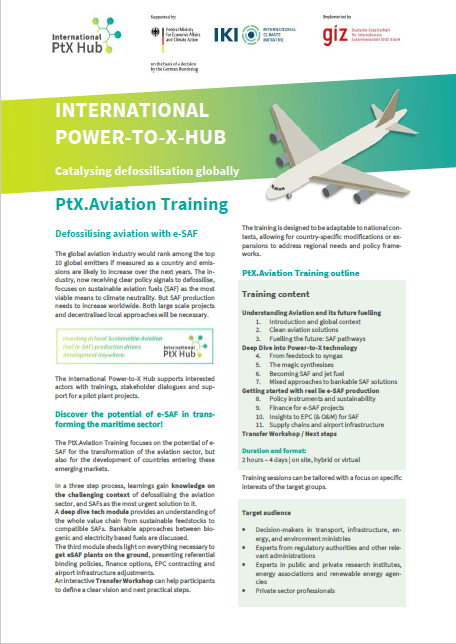Add-on Module
PtX.Aviation Training
Sustainable Aviation Fuel (SAF) is the current strongest tool to defossilise the aviation sector and decrease emissions. The training presents this potential in a broader context, taking into account not only the production chain (feedstock availability and chemical processes) but also policy instruments, certification and practical plant construction issues. A particular focus on e-SAF is given. The link to overall sustainability concerns is established, with the goal to reflect on each country’s development potential with regard to SAF production.
Storyline
The global aviation industry would rank among the top 10 global emitters if measured as a country and emissions are likely to increase over the next years. The industry, now receiving clear policy signals to defossilise, focuses on sustainable aviation fuels (SAF) as the most viable means to climate neutrality. But SAF production needs to increase worldwide. Both large scale projects and decentralised local approaches will be necessary.
The PtX.Aviation Training focuses on the potential of e-SAF for the transformation of the aviation sector, but also for the development of countries entering these emerging markets. In a three-step process, learners gain knowledge on the challenging context of defossilising the aviation sector, and SAFs as the most urgent solution to it. A deep dive tech module provides an understanding of the whole value chain from sustainable feedstocks to compatible SAFs. Bankable approaches between biogenic and electricity-based fuels are discussed. The third module sheds light on relevant aspects to get e-SAF plants on the ground, presenting referential binding policies, finance options, EPC contracting and infrastructurals adjustments. An interactive Transfer Workshop helps participants to define a clear vision and next practical steps.
Training content
The training is designed to be adaptable to national contexts, allowing for country-specific modifications or expansions to address regional needs and policy frameworks.
Understanding Aviation and its future fuelling
- Introduction and global context
- Clean aviation solutions
- Fuelling the future: SAF pathways
Deep Dive into Power-to-X technology
- From feedstock to syngas
- The magic synthesis processes
- Becoming SAF and jet fuel
- Mixed approaches to bankable SAF solutions
Getting started with real life e-SAF production
- Policy instruments and sustainability
- Finance for e-SAF projects
- Insights to EPC (O&M) for SAF
- Supply chains and airport infrastructure
Transfer Workshop / Next steps
Target audience
- Decision-makers in energy, environmental, economic, and development ministries
- Experts of regulatory authorities and other relevant administrations
- Experts in public and private research institutes, energy federations and renewable energy agencies
- Professionals of the private sector
Duration and format
2 hours – 4 days | on site, hybrid or virtual
Status
running
At a glance:

The training is adopted from the material developed by ProQR – Climate-neutral Alternative Fuels and German Aerospace Center (DLR).
Interested? Contact:

Ruth Barbosa
I contribute to the concepts and didactics of our PtX trainings, some I have transferred into self-paced e-learnings. As PtX.Community coordinator, I welcome our alumni and other enthusiasts to stay in touch with us. I am also focal point for our Aviation activities, where I participate in the ongoing discussion on how to make flying more sustainable, e.g. through e-SAF and other innovative solutions. It is exciting to contribute to innovative solutions for our climate crisis. Training people is key to bring clean technologies into practice and scale. In particular, the Aviation sector is where the needed transition affects us all!
Focus
The development of knowledge products on Sustainable Aviation is what I currently focus on. Also, I create a continuous learning environment for our PtX.Community through regular updates and alumni meet-ups.
Mission
A believe our PtX trainings are just the beginning: with them we can contribute to set the agenda and offer tools for a sustainable future.